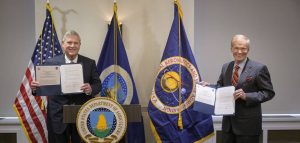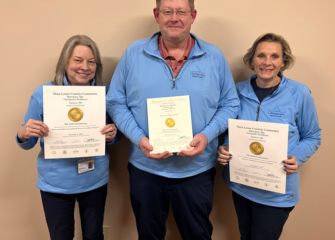
NASA and the USDA (U.S. Department of Agriculture) signed a memorandum of understanding Wednesday strengthening the collaboration between the two agencies, including efforts to improve agricultural and Earth science research, technology, agricultural management, and the application of science data and models to agricultural decision making.
The agreement affirms the two agencies’ interest in continuing their longstanding partnership on mutually beneficial collaborative activities furthering education, communication, and outreach activities to inspire the youth in America to pursue careers in STEM and agriculture. This partnership will build on NASA’s Bridge Program to foster workforce development partnerships with higher-education partners including Tribal and Minority Serving Institutions and the USDA’s newly launched NextGen program, which invests $262.5 million to cultivate the next generation of diverse food and agriculture professionals.
“From the heavens to the Heartland, NASA and the Department of Agriculture are reaffirming our commitment to getting essential data in the hands of America’s farmers and preparing future generations to lead and strengthen America’s agriculture industry,” said NASA Administrator Bill Nelson. “As the climate continues to change, NASA’s Earth observation data will only grow more critical to our nation’s effort to create more climate-resilient food systems, helping our famers develop more sustainable farming and aquaculture practices.”
The agencies intend to explore opportunities to improve crop performance to meet Earth and space-based goals, including activities in support of NASA’s Artemis program, which includes landing the first woman and the first person of color on the Moon, and establishing long-term lunar exploration for preparation of human exploration of Mars.
“From ensuring that future generations are able to reach new heights as they pursue careers in STEM and agriculture, to providing producers with critical data and improving global agricultural practices, USDA is honored to strengthen our partnership with NASA,” said U.S. Secretary of Agriculture Tom Vilsack. “We recognize the critical interface between planet-wide food security, climate change, and space, and together we are advancing cutting edge innovation, research, and workforce development to tackle some of Earth’s greatest challenges.”
Space exploration cooperation with the USDA includes plant-related research on the International Space Station and other space and ground platforms that have led to new ways to improve American and global agriculture, protect the environment, and help improve human health.
This memorandum of understanding will build on the partnership between USDA and NASA starting in 2015. Examples of recent and ongoing efforts include:
- USDA National Institute of Food and Agriculture (NIFA) and NASA, along with North Carolina Agricultural and Technical State University, an 1890 land grant university, partnered to send 16 young people to NASA Space Camp in 2022. Held at the U.S. Space & Rocket Center in Huntsville, Alabama, these week-long camps give youth the chance to learn robotics, teamwork, leadership and critical thinking skills and experience real-world STEM applications.
- USDA National Agricultural Statistics Service (NASS) and NASA created a free online tool called Crop-CASMA to help farmers and researchers use soil data to track droughts and floods, plan crop planting, and forecast ag yields. USDA incorporates the data into NASS’s weekly crop progress reports to inform farmers and farm managers operational decisions and strategic plans.
- USDA Agricultural Research Service (ARS) and NASA scientists are developing a hyperspectral imaging system to monitor plant health for astronauts to use in plant growth chambers for their pick-and-eat crops – such as fresh salad greens – to eat during future space missions. ARS and NASA are also teaming up to discover other ways to grow sustainable, fresh food during space travel, such as plants that have the potential to continually flower and produce.
Learn more about NASA Earth Science initiatives and impact at: https://science.nasa.gov/earth-science/




